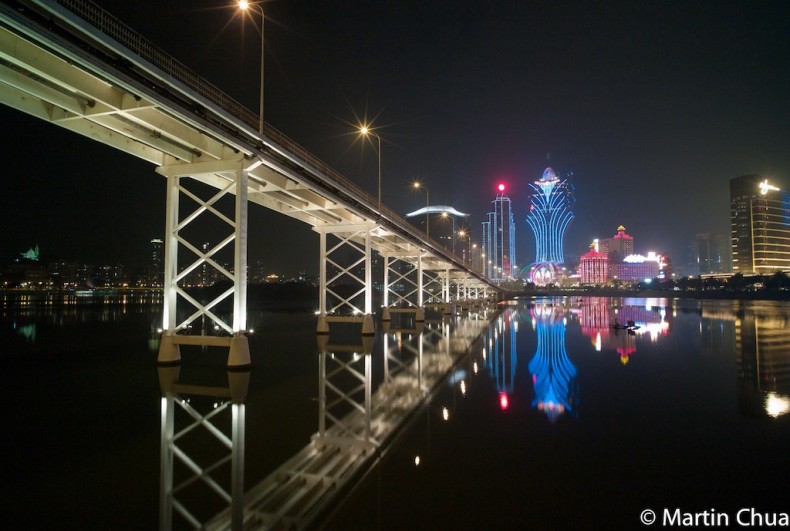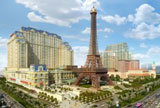Here goes for our Top 10:
1) We won’t see more than one new monthly gaming record
We called the MOP27bn mark for monthly GGR a year ago. We scraped the underside of that in October, at MOP26.8n. We don’t think that mark can be broken until possibly October 2012, despite recent trends in the mass market. The junkets are facing a macro picture in which their customers are grappling with a property market where transactions have fallen by as much as 70% recently, and prices are being slashed by developers in a brutal struggle for survival. Without the junkets firing on all cylinders, MOP27bn is like Mission Impossible, only harder.
2) Bad debt will be a challenge
This is not 2008 all over again. Sheldon Adelson is back in the Forbes Top 10, worth US$20bn. His company, and all the others, are well cashed-up. They could take a bad-debt hit or three. Many of the leading junkets have similarly improved their capital bases by loading up on private equity rather than debt. But little is really known of the way the junket world functions, despite the best efforts of Nick Niglio and the boys at AERL. These people, who still account for three-quarters of GGR, “own Macau” (to quote Adelson). And yet no one can reliably say how they manage their cash flows.
Here’s an educated guess: As in any industry, we see a period of consolidation for the junkets in 2012, as the good consume the bad and the ugly disappear. Relationships between concessionaires and junkets will be put to the test as this process unfolds. Once bad debt levels get to alarming levels for Western-trained casino managers, the question is whether they will pull in their credit lines, and stomach a drop in rolling-chip volumes, or accept the inevitable and write off the debt that they should have seen as a by-product of keeping Wall Street happy anyway.
3) Beijing will keep its grip on the property market, and tighten its grip on Macau
Frankly, we are surprised the Politburo Standing Committee has been able to hold its nerve this long. It’s not quite conflagration yet, but the negative effects of the country’s tight credit policy are being felt sharply across China. The SCMP had a great feature story this week about how the property market is in crisis, with the number of developers expected to be cut by a third this year as nearly a trillion yuan in private-lending loans fall due to people who cannot repay. Prices are being cut by as much as a half in cities such as Beijing and Shanghai as the survival of the fittest is played out, and hundreds of thousands of homeowners are being plunged into negative equity. Land sales have dried up, which means local cadres are having a hard time financing their development plans.
And yet there is no more than a slight change in rhetoric evident in regular dispatches from behind the walls of Zhongnanhai, plus a few cuts in the banks’ reserve ratio requirements. It is clear that the party leadership is united on the need to bring the property market under its thumb, and it may take some time yet. All of which is not good news for Macau’s VIP market.
We obviously wonder how much of this is really about bringing prices to within affordable levels for China’s middle class, and how much is about the center stamping its authority on the periphery. Regardless, we also see a year ahead in which it will be that much harder for Macau’s chief executive to get a sympathetic hearing in Beijing about Cotai land allocations or the table cap.
4) Mass will continue to grow, yet margin assumptions must change.
The equivalent of the junkets in the mass market are the travel agents. Although still smaller as a percentage of arrivals compared to FIT visitors, people who come to Macau via agents will be increasingly important as the longer-distance market grows. These agents need to be paid. But they will do their jobs well and, as long as there are enough hotel rooms available, they will continue to help grow the visitor market beyond Guangdong.
5) The opening of Lot 5 will disrupt the market.
Speaking of buying the mass market, the opening of Lot 5 in April 2012 will likely see an influx of visitors on tour groups as a big new hotel tower comes online. This is what you can do when you have around 1,200 new budget rooms and around 600 luxury rooms at your disposal: hand them out to the best-yielding suppliers. We are less bullish than many other analysts about the impact of these new rooms on gaming revenues for Sands China, simply because we think it’s harder to break a gamblers’ loyalty than it seems (as noted in the case of Galaxy Macau’s opening). However, Sands China does have an important weapon in its arsenal, which is the Venetian brand. Even without the necessary tables at Lot 5, there is still the Venetian across the road. Many predictions for what Lot 5 will do in the VIP market are way off, we believe, but the mass market will undoubtedly flock to the new property.
6) The opening of Lot 5 will benefit COD and hurt Galaxy Macau.
As noted, it takes time to build up the mass business. COD had two years to do it before Galaxy Macau opened; Galaxy Macau will have had only one before Lot 5 opens. Moreover, COD is right next door to the new hotel tower, whereas Galaxy Macau is a long walk away. The center of gravity will undoubtedly form around the other side of Cotai this year. It will be tough for Galaxy Macau’s marketing team to cope.
7) Gingrich will get the GOP nomination, thanks to who?
Newt Gingrich didn’t come up with the line that the Palestinians are an invented nation on his own, we suspect. We don’t really care what his views on the Middle East are, to be honest, but we do care about what he might do to the balance of power between the US and China if he somehow makes it all the way to the Republican Party nomination for the US presidential election. With a certain person’s financial backing, that seems eminently more possible in 2012 than it was in 2011. But that certain person will also make it more likely that the incumbent and his Democratic Party choose to make China the central issue of the presidential election. Would that be good for Macau’s American concessionaires, and one in particular? Hard to imagine, but it might be worth the gamble for a certain person, because if Gingrich somehow makes it all the way to the White House, then the ball game would likely change for him in Macau overnight.
8 ) Jacobs will get his day in court, the question is when
There is little doubt that 30GB of data means the lawyers will be making all the money in 2012 as their billable hours stack up while they wade through tens of thousands of documents submitted into evidence by former Sands China CEO Steve Jacobs against his former employers. But it also means, to our educated guess-prone minds, that he must be pretty confident of having his claims verified. The only question is whether Judge Gonzalez wants to get Jacobs in court and be done with it asap, or whether she will keep allowing the case to be dragged out.
9) SJM will wake up and get moving
SJM management used to take delight in pointing out that Sands China was building on quicksand out in Cotai, and that real gamblers still preferred the peninsula. That complacency cost it dearly when the Venetian opened. Nevertheless, after a few years of struggle, the former monopoly operator regained the upper hand and widened its lead over the upstart. But as 2012 approaches, it is becoming clearer again that Lot 5&6 will tilt the playing field back in Sands China’s favor. Only this time around, it’s obvious that SJM’s brain trust are no longer resting on their laurels. In short, we expect to see SJM move aggressively against its American rival in the coming year.
10) Manila will be on everyone’s radar
A third regional force will arise in the gaming industry in 2012, led by Filipino tycoon Enrique Razon, who has employed an all-star cast to open and manage his new Bloomberry integrated resort in Manila Bay. Bill Weidner, Brad Stone, and Garry Saunders are obviously determined to show that the success of Sands China in Macau and Marina Bay Sands in Singapore wasn’t only due to the chairman’s vision. They have hired an exceptional team already, including Dennis Andreaci and Joe Valdez (who helped get Galaxy Macau open), and we understand one of the best senior executives in Macau, who has been hibernating for the past year, will run the property.
They will be joined in the neighborhood by the Henry Sy-owned integrated resort run by another former Galaxy stalwart, Ciaran Carruthers.
Will Galaxy’s loss be Macau’s loss as well in 2012? It’s hard to make predictions now about the impact of these two new resorts opening in Manila, which is not exactly known as a Chinese tourist-friendly destination. But if the brain drain is any indication, it ought to be competitive.
And that’s it for 2011, folks. As always, please stay tuned, and here’s wishing you all the best for 2012 and beyond. Used with permission and copyright IntelMacau.com.






















